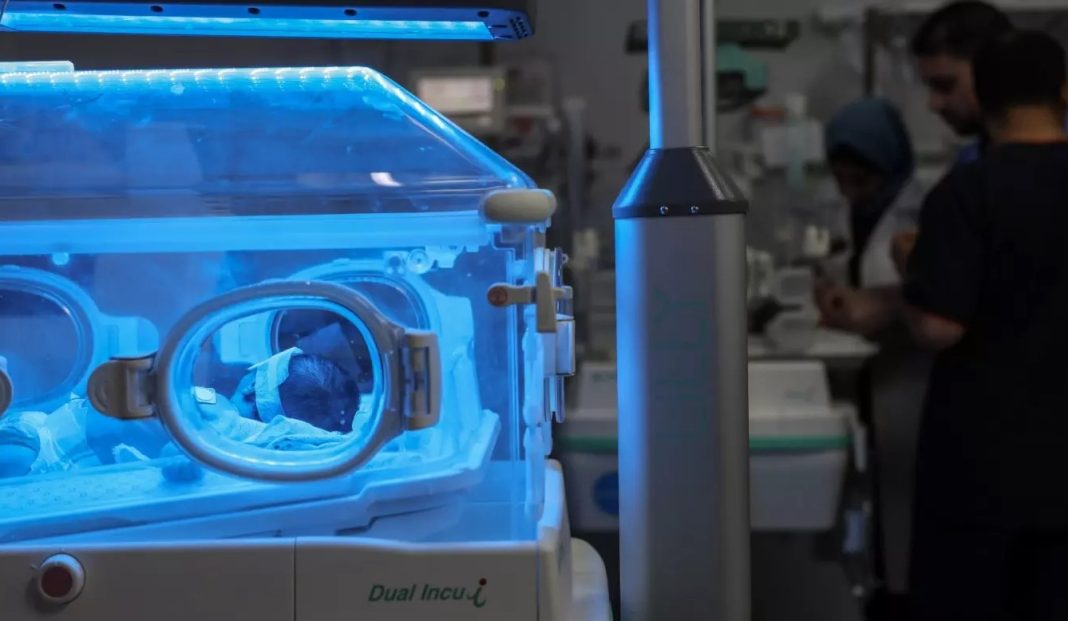Since the early hours of Saturday morning, the Gaza Strip has endured a complete electricity blackout after Israeli authorities cut power supplies to the impoverished territory.
Israel cut electricity supplies after armed groups from Gaza launched a coordinated attack on southern Israel, firing thousands of rockets toward several cities, while some crossed over by using motorcycles and paragliders.
Israel’s energy minister, Israel Katz, stated he ordered the state-run electricity company to cease supplying power to Gaza, leaving much of the region in the dark for the past 24 hours.
“I signed the order instructing the electric company to stop supplying electricity to the Gaza Strip. What was will no longer be,” he said in a post on X, the social media platform formerly known as Twitter.
Hospital staff and medical personnel told MEE that they were relying on backup generators to maintain essential services, as medical facilities were inundated with Palestinians seeking news of their loved ones.
Ashraf al-Qedra, a spokesman for Gaza’s health ministry, said several hospitals were relying on old and “dilapidated” generators which were leading to increased fuel consumption.
“The available fuel reserves are insufficient to sustain hospital operations for a long period of time,” he told MEE, adding, “We are really concerned that the power generators may cease functioning at any given moment.”
To meet the demands of the Strip’s two million residents, Gaza’s sole power plant requires approximately 500MW (megawatts) of electricity. However, even before Israel halted supplies, only 180MW were available.
Normally, Gaza relies on two main sources of electricity: its sole power plant, which has been running at around half its capacity, producing a meager 60MW of electricity out of a potential 120MW, and electricity purchased from Israel, totalling 120MW.
According to the Oslo Accords, which Israel signed with the Palestinian Liberation Organisation in 1993, Israel is responsible for supplying Gaza with 120MW of electricity.
However, the cut in electricity meant that newborn children, Palestinians requiring dialysis, patients with respiratory conditions, and those undergoing surgical procedures were among the worst impacted.
“The number of patients admitted [into hospital] is increasing, particularly heart and surgery cases,” Hassan Abusultan, a nurse at Gaza’s European Hospital, located in Khan Younis, told MEE.
“The pressure [on the department] is worsened by the power cuts. Since [the] early morning, there have been multiple electricity cuts, while we have patients relying on artificial respiration machines which operate using electricity. The frequent power interruptions would certainly put the lives of patients, including newborns, at [inevitable] risk.”
Some staff also lamented the lack of stretchers at the hospital, with some using emergency room beds to move wounded patients to different departments.
Prior to the latest flare-up, Palestinians in Gaza used to receive between six to eight hours of electricity, followed by eight hours of complete blackout.
Homes and businesses depend heavily on generators to make up for the power outages, exacerbating financial difficulties among the trip’s predominantly impoverished population.
Prolonged power outages also affect the water supply, as the pumps responsible for delivering water to residential buildings stop functioning.
“We woke up this morning, and no water was flowing from the faucets due to a 20-hour power outage. We tried running the generators and other backup power sources for a few hours, but it wasn’t sufficient to provide water for our extended family,” Nermin Bassel, a Gaza resident, told MEE.
“In order for water to be pumped into all apartments of our three-story building, we need a consistent supply of electricity for at least five to eight hours,” she said.
Bassel added that she fears the power cuts were hindering the work of the already-devastated health care system.
“I don’t know what I would do if one of my children gets sick in this situation when the hospitals are already struggling to deal with the wounded, or if any of us is actually wounded. It would be a nightmare as we know no proper medical treatment would be provided,” the mother of three continued.
According to data from the Ministry of Health, 44 percent of essential medication and 32 percent of medical disposables in Gaza hospitals were at zero stock.
Exacerbating the crisis in the healthcare system, Israeli fighter jets on Saturday targeted the Indonesian Hospital in the north of Gaza, inflicting damage to the hospital and killing at least one medical staff member, according to the Gaza Ministry of Health.
At least five ambulances have been damaged by the ongoing air strikes since the beginning of the attack.
